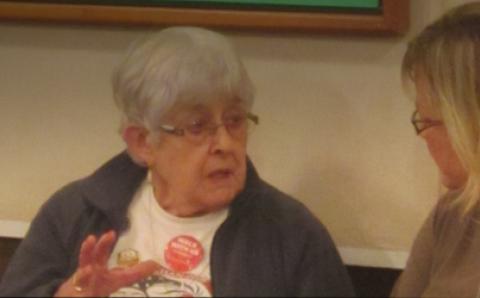God’s Plan for Creation
Harry Cook names DNA as one of the “convincing” evidences “that biological evolution has occurred” (“God’s Plan for Creation,” September 2013). DNA, however, carries information—a language akin to a computer code. Only one cause is sufficient to produce language: intelligence.
Science seeks to explain phenomena by appealing to natural causes. In the case of DNA language, no natural process or mechanism will suffice.
It’s a shame that even theists refuse to admit the limits of naturalistic explanations and give God due praise for directly authoring the language of life—DNA code.
—Jeff Conkin
Haslett, Mich.
Evolution is a theory, not established science. It is offensive for Harry Cook to say that students are first exposed to “simplistic” (biblical) reasons for rejecting evolution and then later encounter “sophisticated” (secular) arguments for evolution (“God’s Plan for Creation”).
My simplistic belief is that in the beginning God created, just as he says he did. He is the only eyewitness.
—Carmen Reitsma
New Sharon, Iowa
Trying Times
I strongly agree with Rev. Joel Boot that we must “all try to prove by our lives that our faith is true” (“Trying Times,” August 2013), especially when modeling our faith to the next generation. Rev. Boot provides some good examples of how Christians can make a difference, but the only lasting impact we make is summarized by C.S. Lewis in Mere Christianity: “The Church exists for nothing else but to draw [people] into Christ. . . . God became Man for no other purpose.”
—Harry Molling
Kentwood, Mich.
Worth the Cost?
Most parents of school-age children fully realize that bringing up their children in the fear of the Lord is first and foremost their responsibility, as well as the responsibility of the church “Are Christian Schools Worth the Cost?” (News, August 2013).
In the past most of us were, with the help of booster clubs, able to pay our Christian school tuition. The tuition level today has for many become a real burden. Families who take their responsibility seriously may well ask themselves, Might not a life without this financial burden give us a better chance to be more intimately involved in our children’s Christ-centered development?
—Gordon Kuipers
North Haledon, N.J.
Learning from Timothy
I’m pleased to say that, 40 years later, we who live on Chicago’s West Side are learning with Timothy Christian School (“Learning from Timothy,” July 2013). Chicago West Side Christian School (CWSCS) was founded in 1969 and is located with Lawndale CRC. This year over 180 pre-K through 8th-grade kids will receive a quality Christ-filled education at CWSCS. We enjoy the ongoing, generous support of the broader CRC community, including our brothers and sisters at Timothy.
Beyond formal arrangements [of support from Timothy], overlapping circles of staff, board, parents, students, congregations and other organizations are resulting in real relationships. I pray that as we all continue to seek Him, our growth will continue to blur racial and economic lines and better reflect the kingdom.
—Dan Wagenmaker
Chicago, Ill.
Playing It Safe
Playing it safe, especially in the church, is detrimental to future developments. So I was grateful for the editorial “Why We Dare Not Play It Safe” (July 2013). The only way to grow up in every way into Christ is by testing the spirits of the time and by maintaining the unity of the body.
The article “Where Do We Draw the Line?” in that issue, controversial as it is, touches on one of the many subjects we have to talk about today. Only then can we be the salt and the light of the world.
—Simon Wolfert
Surrey, British Columbia
We Need Dialogue
I’m a layman, not a theologian or scientist. But as I note the negative reactions to Edwin Walhout’s article “Tomorrow’s Theology” (June 2013), what I miss is the acknowledgment of the Reformed doctrines that legitimize his approach. The Belgic Confession, Article 2, identifies not one but two ways to know God. It calls creation “a beautiful book.” A century ago, Calvin Seminary president Louis Berkhof spent many pages in his Manual of Reformed Doctrine noting the similarities and differences of what he called general and special revelation, pointing out that each needs the other to fully reveal God’s truth. As recently as 1990, H. Henry Meeter’s The Basic Idea of Calvinism picked up the same theme, calling the book of nature “God’s book.”
Maybe our dialogue will contain less suspicion and alarm when Reformed scholars in many disciplines push the envelope doing what our Reformed tradition calls them to do.
Dialogue we need; diatribe we don’t.
—Donald Oppewal
Lowell, Mich.
In 2010 the members of a list of nearly 1,000 scientists from around the world, many of whom were department heads of prestigious institutions, made a public declaration about the inadequacy of the evolutionary hypothesis to explain the facts as we presently know them. Just last year one of the world’s leading philosophers of science, Thomas Nagel (an avowed atheist), published a book with the subtitle “Why the Materialist Neo-Darwinian Conception of Nature Is Almost Certainly False.” In his conclusion he went one better than Walhout (“Tomorrow’s Theology”) by declaring that it would only be a matter of “a generation or two” before the contemporary scientists would “be laughing at” the “present right-thinking consensus.”
And yet we now have a leader within the CRC who is seriously suggesting that we accept evolution as “a fact.” Too often leaders of the institutional church are affirming as fact what members of the natural science community are either abandoning or are calling into question. Careful attention to the current debate seems to indicate that perhaps the tide has turned on this issue, and evolutionists, theistic or otherwise, are going to have to find a new paradigm.
—Kerry John Hollingsworth
Grand Rapids, Mich.








